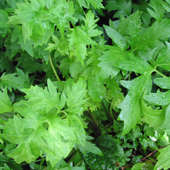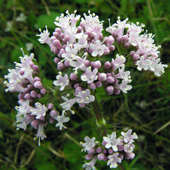Valerian
Herbal Remedies and Medicinal Cures for Diseases, Ailments & Illnesses that afflict Humans and Animals
Aloe Vera •
Astragalus •
Bankoro •
Bilberry •
Bitter Gourd (Ampalaya) •
Bitter Orange •
Black Cohosh •
Cat's Claw •
Chamomile •
Chasteberry •
Coconut •
Cranberry •
Dandelion •
Echinacea •
Ephedra •
European Elder Tree •
Evening Primrose •
Fenugreek •
Feverfew •
Flaxseed •
Garlic •
Ginger •
Ginkgo •
Ginseng (Asian) •
Golden Seal •
Grape Seed •
Green Tea •
Hawthorn •
Hoodia •
Horse Chestnut •
Kava •
Lavender •
Licorice •
Malunggay Moringa Oleifera •
Milk Thistle •
Mistletoe •
Passion Flower •
Peppermint Oil •
Red Clover •
Ringworm Bush (Akapulko) – Cassia alata •
Saw Palmetto •
St. John's Wort •
Tawa Tawa •
Turmeric •
Valerian •
Yohimbe •
accept the bitter to get better
 Valerian Leaves | |||
| |||
 Valerian Flowers | |||
| |||
 Valerian Red Spur |
Valerian
The medicinal herb Valerian as an alternative herbal remedy for headaches and depression - Valerian is a plant native to Europe and Asia; it is also found in North America.Common Names--valerian, all-heal, garden heliotrope
Latin Names--Valeriana officinalis
What Valerian Is Used For
- Valerian has long been used for sleep disorders and anxiety.
- Valerian has also been used for other conditions, such as headaches, depression, irregular heartbeat, and trembling.
Herbal Remedy Products with Valerian as part of the ingredients
| |
|
Valerian root has a long and illustrious history and appears in recorded writings from ancient Greece and Rome. It’s well-known for its soothing and calming properties and for its ability to encourage peaceful slumber. Research suggests that natural chemicals found in valerian act on GABA receptors in the brain. Due to its long history of use, valerian has been well-studied. There are also many scientific studies which support its benefits. Marder M, Viola H, Wasowski C, Fernández S, Medina JH, Paladini AC (2003). "6-methylapigenin and hesperidin: new valeriana flavonoids with activity on the CNS". Pharmacol Biochem Behav 75 (3): 537–45. ; Fernández S, Wasowski C, Paladini AC, Marder M (2004). "Sedative and sleep-enhancing properties of linarin, a flavonoid-isolated from Valeriana officinalis.". Pharmacol Biochem Behav 77 (2): 399–404.. Holzl J, Godau P. (1989). "Receptor binding studies with Valeriana officinalis on the benzodiazepine receptor.". Planta Medica 55: 642. doi:10.1055/s-2006-962221. ; Mennini T, Bernasconi P, et al. (1993). "In vitro study in the interaction of extracts and pure compounds from Valerian officinalis roots with GABA, benzodiazepine and barbiturate receptors". Fitoterapia 64: 291–300.
How Valerian Is Used
- The roots and rhizomes (underground stems) of valerian are typically used to make supplements, including capsules, tablets, and liquid extracts, as well as teas.
What the Science Says about Valerian
- Research suggests that valerian may be helpful for insomnia, but there is not enough evidence from well-designed studies to confirm this.
- There is not enough scientific evidence to determine whether valerian works for anxiety or for other conditions, such as depression and headaches.
- NCCAM is funding a study to look at the effects of valerian on sleep in healthy older adults and in people with Parkinson's disease.
Side Effects and Cautions of Valerian
- Studies suggest that valerian is generally safe to use for short periods of time (for example, 4 to 6 weeks).
- No information is available about the long-term safety of valerian.
- Valerian can cause mild side effects, such as headaches, dizziness, upset stomach, and tiredness the morning after its use.
- Tell your health care providers about any herb or dietary supplement you are using, including valerian. This helps to ensure safe and coordinated care.
News About Valerian
Valerian Root for Sleep Improvement
- Source:http://www.motherearthnews.com/natural-health/valerian-root-for-sleep-improvement-zbcz1503.aspx
- By Chelsea Clark (Natural Health Advisory Institute)
Have trouble falling and staying asleep? Suffer from insomnia or another sleep disorder? No one enjoys lying awake at night trying, to no avail, to drift into sleep. While over-the-counter sleep medications or prescription drugs might be tempting to combat a sleepless night, they don’t always work and can put you at risk for several negative side effects, such as cognitive impairment. These can be especially dangerous for youth. Instead, look to all-natural herbal solutions, such as valerian root, for sleep disorder and insomnia treatment. What Is Valerian Root?
Valerian is an herb that has yellowish-brown roots, dark green leaves, and white and pink flowers. The root of this plant has been used for centuries for its medicinal properties. Primarily, valerian is known for it’s sedative qualities, which can help to increase sleepiness, as well as to decrease nervousness and restlessness. In many European countries, valerian root extract is a commonly used, approved over-the-counter medicine for the treatment of insomnia, anxiety, and disturbed sleep.
Valerian has a variety of active compounds that give it these sedative qualities. These include valerenic acid, amino acids, and more. Although the mechanism is not entirely known, researchers do know that valerian root extracts increase the activity of GABA, one of the body’s main neurotransmitters that reduces excitability of the nervous system. By doing so, valerian has a calming effect in the body. Does Valerian Improve Sleep Quality?
Studies have found significant improvements in sleep quality, the amount of time it takes to fall asleep, and the depth of sleep in studies using valerian root. One review found that valerian may decrease the time it takes to fall asleep by 14 to 17 minutes. Another study found that 530 mg daily of valerian root significantly improved insomnia symptoms in postmenopausal women aged 50 to 60 years old.
Valerian root can mimic the effects of some anti-anxiety and sleep medications, but it is without side effects and is considered very safe. One of the main advantages of valerian is that it does not produce a “hangover” effect, meaning that no side effects are felt upon waking. It is also useful for the treatment of anxiety, depression, and restlessness, as well. A Combination of Herbs Is Often Most Effective
Valerian alone may produce substantial benefits and can help you to fall asleep and stay asleep, but many studies show that using valerian in combination with other sedative herbs is extremely effective. Try valerian with hops extract (Humulus lupulus), which has been shown to increase time spent sleeping as well as time spent in deeper sleep.Lemon balm and valerian is another effective combination, which can be used in children to help reduce restlessness and promote healthy sleep. How to Use Valerian Root for Sleep Improvement
Valerian can be purchased as a dietary supplement. The recommended dose ranges from 30 to 600 mg daily about 30 minutes to two hours before bedtime. You might also try valerian root tea, which can be found in natural groceries. Drink a cup of tea before bed to promote sleep.
Valerian Root for Sleep Improvement
- Source:http://www.motherearthnews.com/natural-health/valerian-root-for-sleep-improvement-zbcz1503.aspx
- By Chelsea Clark (Natural Health Advisory Institute)
Have trouble falling and staying asleep? Suffer from insomnia or another sleep disorder? No one enjoys lying awake at night trying, to no avail, to drift into sleep. While over-the-counter sleep medications or prescription drugs might be tempting to combat a sleepless night, they don’t always work and can put you at risk for several negative side effects, such as cognitive impairment. These can be especially dangerous for youth. Instead, look to all-natural herbal solutions, such as valerian root, for sleep disorder and insomnia treatment.
- What Is Valerian Root?
Valerian is an herb that has yellowish-brown roots, dark green leaves, and white and pink flowers. The root of this plant has been used for centuries for its medicinal properties. Primarily, valerian is known for it’s sedative qualities, which can help to increase sleepiness, as well as to decrease nervousness and restlessness. In many European countries, valerian root extract is a commonly used, approved over-the-counter medicine for the treatment of insomnia, anxiety, and disturbed sleep.
Valerian has a variety of active compounds that give it these sedative qualities. These include valerenic acid, amino acids, and more. Although the mechanism is not entirely known, researchers do know that valerian root extracts increase the activity of GABA, one of the body’s main neurotransmitters that reduces excitability of the nervous system. By doing so, valerian has a calming effect in the body.
- Does Valerian Improve Sleep Quality?
Studies have found significant improvements in sleep quality, the amount of time it takes to fall asleep, and the depth of sleep in studies using valerian root. One review found that valerian may decrease the time it takes to fall asleep by 14 to 17 minutes. Another study found that 530 mg daily of valerian root significantly improved insomnia symptoms in postmenopausal women aged 50 to 60 years old.
Valerian root can mimic the effects of some anti-anxiety and sleep medications, but it is without side effects and is considered very safe. One of the main advantages of valerian is that it does not produce a “hangover” effect, meaning that no side effects are felt upon waking. It is also useful for the treatment of anxiety, depression, and restlessness, as well.
- A Combination of Herbs Is Often Most Effective
Valerian alone may produce substantial benefits and can help you to fall asleep and stay asleep, but many studies show that using valerian in combination with other sedative herbs is extremely effective. Try valerian with hops extract (Humulus lupulus), which has been shown to increase time spent sleeping as well as time spent in deeper sleep. Lemon balm and valerian is another effective combination, which can be used in children to help reduce restlessness and promote healthy sleep. How to Use Valerian Root for Sleep Improvement
Valerian can be purchased as a dietary supplement. The recommended dose ranges from 30 to 600 mg daily about 30 minutes to two hours before bedtime. You might also try valerian root tea, which can be found in natural groceries. Drink a cup of tea before bed to promote sleep.
Visit Natural Health Advisory Institute for more tips on how to relieve insomnia and get a better night’s rest.